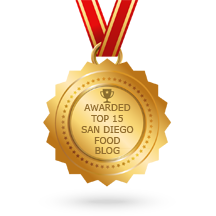Eat Well Guide Helps San Diego Consumers Find Locally Grown Sustainable Food
 |
| Photo from GRACE Communications Foundation |
So I was intrigued when about this time I learned about the launch of a free new website that claims to be the largest curated directory of sustainable food vendors. The Eat Well Guide has some 25,000 listings of restaurants, farms, farmers' markets, and food co-ops across the country. It is produced and maintained by the GRACE Communications Foundation, whose mission, they state, is "to develop innovative strategies to increase public awareness of the critical environmental and public health issues created by our current food, water and energy systems, and to promote a more sustainable future." Originally created in 2003 to help people find animal products from sustainable guides, the guide has evolved and grown. Now the idea for the guide is to make it easy for consumers around the country to find sustainable food vendors for free.
There are eight listing categories: restaurants; farms; farmers markets; stores; beer, wine and cocktails; chefs, caterers, and meal delivery; bed and breakfasts; and organizations.
San Diego is one of the initial 18 cities included. To be listed in the Eat Well Guide, the organization says that vendors must demonstrate a commitment to supporting sustainable agriculture. According to GRACE Communications Foundation's Samantha Sanchez, the organization determines conformation to the standards through the vendor's website, "and if we aren't sure, then we make phone calls, find out about their purveyors, find out more about the chef, look for certifications, etc." And, she emphasized, vendors can't pay to play.
Basically, I think this is a great idea, but it doesn't quite feel like it's ready for primetime. For one thing, it's unclear how they've developed their initial list. Locals will scratch their heads at the inclusion of places like Trader Joe's (love them but local?). The website's info page explains that, "restaurants, markets, food co-ops and other businesses included in the Eat Well Guide demonstrate a sincere commitment to sourcing local, sustainably produced food." So, intent seems to factor high here. If you sell products that include organic ingredients, that may be enough, even if they aren't local or sustainable. As they say, "Our goal is to allow for a spectrum of sustainability, encouraging businesses to adopt increasingly sustainable food sourcing practices as they are able." I worry that that caveat allows for more skeptical consumers.
Another issue I have is that some of the vendors and organizations I found show up only in searches, including searches for other, non-related vendors. Currently, there are only 31 listings on the San Diego home page--all but two are restaurants; those other two fall under beer, wine, and cocktails. However, there appear to be many more local vendors and organizations in the database. For instance, The Wellington Steak and Martini Lounge is on the San Diego page, but not sister restaurant The Red Door--until you do a specific search for it. That search also pulled up vendors like Bread and Cie, Charlie's Best Bread, Trader Joe's, Eat Right Chef Service, and The Counter Burger, as well as Slow Food. Huh? I also did a search for the Little Italy Mercato and it, too, came up independently. The Hillcrest Farmer's Market showed up in another targeted search, but along with several other farmers markets (including one for Tierrasanta, which hasn't existed for years; I know because I live in the neighborhood), Whole Foods, and OB People's Market. Somehow the site hasn't swept them all into the San Diego page and clearly the search mechanism is a bit funky. Hopefully, that will be corrected soon. I also suggest those of us who are knowledgeable, are vendors, and are eager to help this become a more robust offering go on the site and suggest listings.
The listings themselves contain contact information and basics about the vendors and organizations, as well as a map, hours/days open, and other vendors close by--thanks to its incorporation of Google maps. So, as it matures it will be a handy guide for locals, as well as for travelers looking for places to eat that represent what's local and sustainable in the area.
Print Page














No comments:
Post a Comment